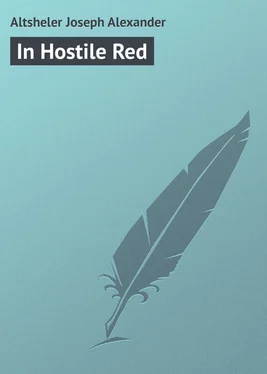Joseph Altsheler - In Hostile Red
Здесь есть возможность читать онлайн «Joseph Altsheler - In Hostile Red» — ознакомительный отрывок электронной книги совершенно бесплатно, а после прочтения отрывка купить полную версию. В некоторых случаях можно слушать аудио, скачать через торрент в формате fb2 и присутствует краткое содержание. Жанр: foreign_prose, на английском языке. Описание произведения, (предисловие) а так же отзывы посетителей доступны на портале библиотеки ЛибКат.
- Название:In Hostile Red
- Автор:
- Жанр:
- Год:неизвестен
- ISBN:нет данных
- Рейтинг книги:5 / 5. Голосов: 1
-
Избранное:Добавить в избранное
- Отзывы:
-
Ваша оценка:
- 100
- 1
- 2
- 3
- 4
- 5
In Hostile Red: краткое содержание, описание и аннотация
Предлагаем к чтению аннотацию, описание, краткое содержание или предисловие (зависит от того, что написал сам автор книги «In Hostile Red»). Если вы не нашли необходимую информацию о книге — напишите в комментариях, мы постараемся отыскать её.
In Hostile Red — читать онлайн ознакомительный отрывок
Ниже представлен текст книги, разбитый по страницам. Система сохранения места последней прочитанной страницы, позволяет с удобством читать онлайн бесплатно книгу «In Hostile Red», без необходимости каждый раз заново искать на чём Вы остановились. Поставьте закладку, и сможете в любой момент перейти на страницу, на которой закончили чтение.
Интервал:
Закладка:
Chapter Five — The Work of Wildfoot
I remained for a minute or two in a stupor, superinduced by the excitement of the fight and my great physical exertions. From this I was aroused by Barton, who was now in command, Blake being disabled.
"It was gallantly done, Lieutenant Melville," he said. "You have saved our captain's life."
"Are you sure he is still living?" I asked.
"He is stunned by the shock he received when that great rebel hurled him to the ground," said Barton, "but he will be well enough in time."
"You have saved more lives than Blake's," whispered Marcel, as Barton turned. "You have saved yours and mine, for that villain Belfort suspected that you threw your horse purposely against his. In face of this he dare not declare his suspicions."
"By the way," resumed Marcel, a moment later, "you might ask our haughty Norman noble over there if the rebel dogs can fight."
I did not ask the question, though, had time and place been otherwise, it would have pleased me much to do so.
All the troopers had dismounted and were putting themselves in posture of defence behind the rocks, hillocks, and trees. Barton expected another attack upon the instant, but it was not made. In fact, when he examined with his field-glass the wood into which Wildfoot and his men had withdrawn, he announced that he could see naught of them.
"I see nothing among those trees over there," he said; "not a horse, not a man. Verily the fellows have learned to perfection the art of hiding themselves. By St. George, they need it in their dealings with us!"
It was sometimes the temper of the British in our country to boast and to show arrogance even when sore outwitted and outfought by us, and then to wonder why we did not love them. Perhaps this fault was not theirs, exclusively.
"Likely enough this silence is some new trick," said Belfort, "some scheme to draw us into another ambush."
"I suspect that you speak the truth," replied Barton. "Stand close, men. We have suffered too much already to risk another trap."
The men were quite willing to obey his order and stand close. Thus we waited. Blake revived by and by, and a careful examination showed that he had no bones broken, though he was sore in every muscle and still somewhat dazed in mind. But he was urgent in entreating his officers not to take excessive risks.
"I fancy that we have nothing to do but to wait here," said Barton to him, "for the rebels will of a surety attack us again very soon."
But in this Barton was mistaken, for the Americans seemed to have gone away. We waited a full hour, and then, as they gave no evidence of being anywhere near us, a small scouting-party was sent out, which presently returned with word that they were in truth gone, and that the woods were empty.
"They feared to attack us when we were on our guard," said Barton, triumphantly. "There is naught for us to do now but to go and escort the wagon-train back to the city."
We gathered up the wounded and rode over the ridge in search of the wagon-train. We found with ease the tracks of the wheels and followed them towards the city, expecting to overtake the wagons. Presently, as we turned around a hill, we rode almost full tilt into three or four of them lying upon the ground, too much shattered and broken ever to be of use again.
In his surprise Barton reined back his horse against mine, for I rode just behind him.
"What is this?" he exclaimed.
"It seems that we have the wagon-train, or what is left of it," said Marcel. "There is a placard; it may inform us."
A pine board was stuck in a conspicuous place upon one of the wagons, and some words had been written upon it with a piece of charcoal. We rode forward and read, —
"To Sir William Howe or His Representative.
For the Wagons and their Contents
We Are Much Indebted
As we were Hungry
And You Have Fed Us.
We Give You Leave to Take Repayment
At Such Time and Place
As You May Choose.
"William Wildfoot."
Barton swore in his rage. It was easy enough to see now why the patriots had withdrawn after the first attack. The provision-train was more valuable than arms or prisoners to the American army, and, barring the broken wagons, Wildfoot and his men had carried off everything. Nor were the British in any trim to pursue, a business at which, most like, they would have had their faces slapped.
Barton swore with a force and fluency that I have seldom heard surpassed, and Blake said with a melancholy smile, —
"It is well that I have this broken head to offer as some sort of an excuse, or I think it would go hard with me."
He spoke truly, for, though his expedition had been a most dire failure, his own condition was proof that he had done valiant duty.
The British gathered up their wounded again and began their march to the city. The country glowed in the brilliant sunshine of a summer afternoon, but I was in no mood to enjoy its beauty now. Our column marched mournfully along, as sad as a funeral procession. Even though the victory had gone where I wished it to go, yet there were others before my eyes, and I felt sorrow for them in their wounds and defeat.
When we approached Philadelphia, some people on horseback turned and galloped towards us. As they came nearer, I saw that two of them were women, one of whom I recognized as Miss Desmond. They were accompanied by two British officers whom I had seen at the banquet, Colonel Ingram and Major Parsons. The other young woman I learned afterwards was the daughter of a rich Tory of Philadelphia.
Belfort rode forward to meet them, and Marcel and I followed, though at a somewhat slacker pace. We could take this privilege, as we were now within the lines. I judged that the officers and the ladies had been taking a ride for the sake of the air and the exercise, and such proved to be the case.
"Here comes Blake's expedition," exclaimed Ingram, as they rode up, "and I see wounded men. Verily I believe we have taken the rebel Wildfoot at last."
"Is it true, Lieutenant Belfort?" asked Miss Desmond. "Has the robber Wildfoot been taken?"
Belfort was thrown into a state of embarrassment by this question, to which he knew he must return an unwelcome answer; and he hesitated, pulling uneasily at his bridle-rein. But Marcel, the readiness of whose wit was equalled only by his lack of a sense of responsibility, spoke up.
"I fear, Miss Desmond," he said, "that we have but sad news. The wounded men you see are not rebels, but our own. As for Mr. Wildfoot the robber, we suspect that he has had fine entertainment at our expense. Of a certainty he gave us all the sport we wanted."
"It was a trick, a dastard American trick!" exclaimed Belfort. "They gave us no chance."
"Then you have not captured this Wildfoot?" asked Miss Desmond.
"No," replied Marcel. "He came much nearer to capturing us, and in addition he has taken off our wagon-train, provisions, bullocks, drivers, and all, which I dare say will be welcome food to the Americans, drivers included, for we hear that they are starving."
"They did not stay to fight us to the end," broke in Belfort, "but ran away with the spoil."
"No doubt they had obtained all they wanted," said Miss Desmond, dryly. "Do not forget, Lieutenant Belfort, that, however misguided my countrymen may be, they are able to meet anybody in battle, Englishmen not excepted."
"For you to say anything makes it true," said Belfort.
"You should also take note," said Marcel, "that Miss Desmond is more chivalrous than some other opponents of the Americans."
"I do not take your full meaning," said Belfort.
"It is easy enough to understand it," said Marcel. "Miss Desmond gives to our enemies the credit for the bravery and skill which they have shown so plainly that they possess."
Читать дальшеИнтервал:
Закладка:
Похожие книги на «In Hostile Red»
Представляем Вашему вниманию похожие книги на «In Hostile Red» списком для выбора. Мы отобрали схожую по названию и смыслу литературу в надежде предоставить читателям больше вариантов отыскать новые, интересные, ещё непрочитанные произведения.
Обсуждение, отзывы о книге «In Hostile Red» и просто собственные мнения читателей. Оставьте ваши комментарии, напишите, что Вы думаете о произведении, его смысле или главных героях. Укажите что конкретно понравилось, а что нет, и почему Вы так считаете.












